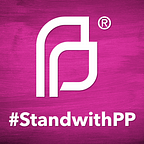On Trans Day of Visibility, Let’s Call for Inclusive Health Care for ALL
By Bailey C Elis, Planned Parenthood of Greater New York Patient and Activist
Going to the doctor for any reason is uncomfortable, nerve-wracking, and can be downright painful. But what if they continuously called you the wrong name? What if they kept referring to you as “she” when you’re a “he”? What if they kept asking invasive questions about your body that have nothing to do with what you’re there for, or just even flat-out refused to treat you on basis of “religious beliefs”? To top it off, what if that’s completely legal for them to do, even if the care you needed was a matter of life or death?
That’s a reality transgender, nonbinary, and gender non-conforming people face with every medical visit. As tensions continue to rise regarding healthcare, especially around reproductive rights, transgender people are frequently left out of the conversation or left out as a “compromise” for politicians, who frequently fight to deny us access to safe, affordable, and affirming care.
In June 2020, the Trump administration, in the midst of global pandemic, stripped nondiscrimination protections for LGBTQ people for healthcare, defining sex discrimination as discrimination for “being male or female.” This left the door open for medical professionals to deny care to transgender people, such as transmasculine people in need of ovarian cancer treatment, allowing insurers to deny coverage or raising the price if the procedure relates — or supposedly relates — to someone’s gender transition. As horrific as this is, this is only one event in a long history of transgender people being discriminated against in healthcare.
When seeking any sort of healthcare, transgender people have more than just the concern of cost, location, or insurance coverage on the mind — they also have to be sure this doctor will treat them correctly, if at all. I know this firsthand; my first endocrinologist was a nightmare. This doctor was the only one providing hormone replacement therapy even remotely close to me at the time,and the forms had language that didn’t allow for me to properly say what I was there for. Her office constantly deadnamed me, misgendered me, refused to teach me how to self-inject (after forcing me to drive an hour each way to their office and back, I put my foot down and they finally taught my husband how to give me my shots in my glute) and would frequently “forget” to send my prescription in, or have to cancel appointments out of the blue. Also, of note, her office never promoted hormone replacement therapy anywhere on the website or in-office literature; I only found out through calling and asking.
Though I’m lucky to now receive trans-affirming healthcare through Planned Parenthood, so many others aren’t so lucky. Now more than ever, with all eyes on affordable healthcare as a global pandemic drags on, we need trans-affirming care included in healthcare reform plans. This means a welcoming environment for people of all genders, expressions, and pronouns, anti-discrimination laws that protect against doctors and insurance companies that seek to deny coverage and care to us, up-to-date education and training about transgender and non-binary identities, and inclusive wording on medical forms.
A lot of these things can seem trivial or meaningless, but it all adds up to reducing violence against the transgender community. Planned Parenthood creates a welcoming and inclusive environment for everyone. In my own personal case, I’m relieved to not have to be asked invasive and unnecessary questions or have to jump through hoops just to get the proper care. It makes managing my health that much easier.
By Bailey C Elis, Planned Parenthood of Greater New York patient and activist.
